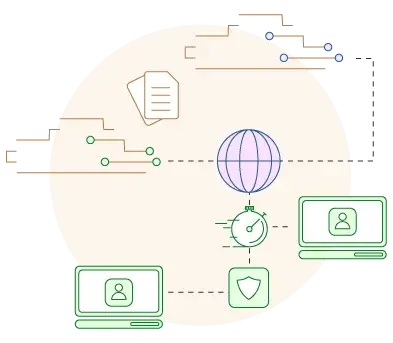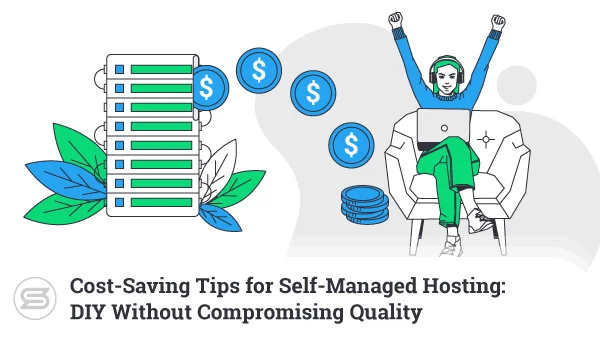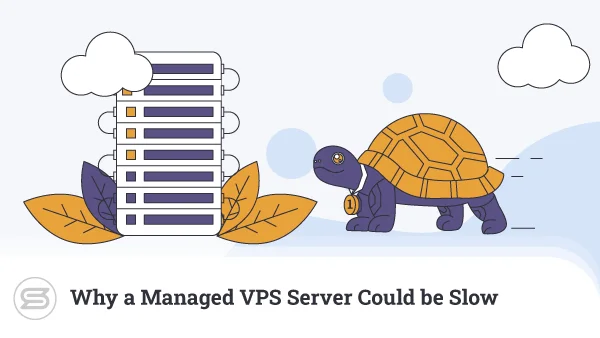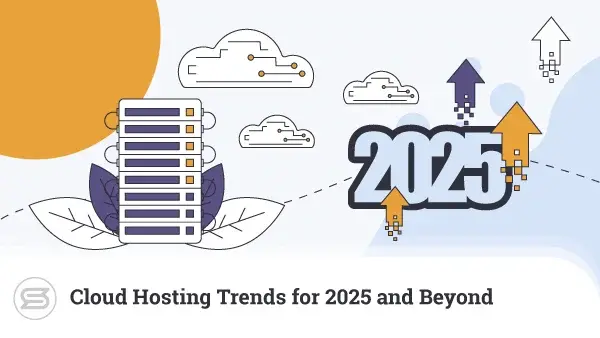Choosing the best hosting for educational websites depends on what you want to do with it. Despite sharing a common vertical, the scope of capabilities of an educational website can greatly vary.
Shared hosting and Managed Virtual Private Server (VPS) offer unique advantages and drawbacks for e-learning projects. Let’s discover which is better and why.
What is an Educational Website?
An educational (or LMS) website refers to any site that has a learning purpose behind it. Such pages carry some unique characteristics, which will significantly affect the choice of hosting plan.
For example, an educational website can refer to a static site presenting general information about a particular institute. Alternatively, it can also refer to a site for an institute with information, a student portal, forums, online tests, and more.
The more features an educational website has – the higher its long-term potential. Some commonly-employed functions include:
- Curriculum-specific information
- Forum for interaction
- Course content dissemination facilities
- Online testing and grading
- Coursework submission system
A properly developed educational website can lower operational costs by increasing efficiency. It can also prove an invaluable tool for easy access to premium content to both staff and students.
Types of Educational Websites
Although features are modular and websites can contain any mix-and-match of them, many educational websites are purpose-built. To give a better idea of what types of educational websites exist, let’s look at some examples.
eLearning Portals
eLearning portals help facilitate distance learning by offering a collection of tools to online students. These typically include remote access to coursework in various forms like text, video, or presentations. Users can also have live teaching feeds as well as partake in digital tests.
The eLearning portal will typically have three main objectives: content management, content delivery, plus assessment and reporting. In some cases, the eLearning portal will also offer channels for communication and social learning.
Digital Content Serving Sites
Some educational websites focus on allowing students to access course content remotely. This content will be in the form of digitally-downloadable information that can either replace or supplement the one you obtained during class attendance.
Examples of digital course content include course roadmaps, lecture recordings in voice or video format, supplemental information, and more.
Educational Video Websites
Although videos fall under the digital content category, some educational websites are built specifically around this medium. Video content presents many advantages from an academic perspective.
It allows for a quick presentation of large amounts of information and facilitates a much clearer demonstration of methods. Studies have also shown that viewers can retain up to 95% of audio-visual content, making it ideal for learning.
Gamification Websites
While gaming and education may sound counterproductive when put together, this is not necessarily true. Gamification has become an increasingly popular strategy to foster increased engagement in education.
When developed correctly, educational gamification websites have shown the ability to enhance specific skills. One example of such a project is Brainscape, which helps users quickly identify and quantify mistakes.
Language-Learning Website
The language-learning website is an excellent example of a purpose-built site rather than one that revolves around specific features. It can present information and materials in various ways, all with a common theme – get the grasp of a new language.
Some language learning websites are designed for general use, while others may have specialized language courses.
Learning Management System
The LMS is a web-based application designed to help users create, distribute, and manage education materials. It is similar to a content management system (CMS) in many ways but specifically designed to support the education vertical.
LMS solutions allow educational institutes to quickly build and deploy educational learning-based websites with little to no previous experience. Such platforms help in many ways, potentially lowering deployment costs, allowing the choice of web hosting, and streamlining site building processes.
How to Choose Web Hosting for Educational Websites?
As more people gain access to broadband connectivity, websites are increasingly growing in capability. While this is excellent for students, the increased functionality often puts additional strain on your web server.
Due to this potential strain, you can follow some useful guidelines on choosing a hosting plan for an educational website.
Areas to keep a lookout on include:
Performance
As modern devices allow for increasingly faster connection speeds, users show less and less tolerance for low-performing websites. For example, students who are unhappy with the loading speed of your educational website may end up closing the browser tab instead, never to return.
Web hosting providers vary widely in the type of equipment they offer, the infrastructure it sits on, and even in expertise when managing the hosting deployment. That’s why it’s important to find a reputable web hosting service provider with enough experience with VPS hosting.
Reliability
Hardware and software are susceptible to failure – that’s a fact. However, a good host can mitigate the damage by offering redundancy and comprehensive systems to help you backup your educational website.
Besides backups, you should also consider how easy it would be to restore your site in case of an emergency.
Application Availability
Unless you’re building a custom educational website, you will likely be employing a generic LMS web application. Keep in mind that not all web hosting providers will have or even support the software you have in mind.
In some cases, web hosts may also offer specific plans tailored to niche LMS users. For example, ScalaHosting provides a range of Moodle hosting plans for the optimal running of the Moodle LMS platform.
Customer Support
Even if you have a dedicated IT team to support your educational website, you will still need to contact your hosting support sooner or later. Making sure that the host you choose has a responsive support team is vital to a smooth experience.
Before signing up with a host, try to get in touch with their operators and see how their processes work. Make sure to also note what support channels are available – phone, email, live chat, Knowledge Base section, or ticketing system.
Price
How much to pay for web hosting is something many website owners struggle over. This ongoing cost can make smaller educational institutes feel the pinch, especially for starters. Hosting equipment and expertise cost a lot of money, even though web hosts already dilute that expense among multiple customers.
Avoid focusing too much on price as the cheapest web hosting option is seldom the most suitable option. Try to focus on performance over price to avoid settling with a poorly performing educational website.
Keeping these points in mind, let’s take a look at two popular web hosting categories for LMS projects.
Shared Hosting for Educational Websites
Shared hosting is the most affordable type of web hosting. The low initial investments make the service popular among individuals and startups, but there are some disadvantages to consider.
A single server often plays home to hundreds of websites sharing the same resources such as CPU time, memory, and bandwidth. Each time a visitor access a site, the server utilizes some of those resources.
As you can imagine, with the more visitors coming in – your loading speeds might suffer. And it doesn’t even have to be your project. If your website happens to be on the same server with a high-traffic online project, it may struggle to find the resources it needs to run smoothly.
Because of the shared environment, security is also a factor of concern. If one website on the server gets hacked or otherwise compromised – your site may easily be affected as well. For educational sites that store student data, this can be a critical situation.
Despite these drawbacks, shared hosting remains one of the easiest types of service in terms of management. The solutions come with a full suite of Graphic User Interface (GUI)-based tools that help with website management.
Shared hosting is suitable for:
- Simple websites with basic content
- Personal pages
- Sites with low to medium traffic usage
Managed VPS Hosting for Educational Websites
This increased cost of VPS hosting might deter potential clients at first. Still, factors like dedicated system resources, fewer customer accounts per server, and enhanced customization control will soon make you reconsider.
Sure, VPS plans require a bit more technical skills to manage – something that not all website owners can handle. However, opting for managed VPS also means access to robust, scalable plans managed on your behalf.
The primary advantage of VPS hosting lies in its superior performance and security, which make it well-suited for:
- Dynamic content websites
- Ecommerce stores
- Web-application based platforms
- Sites containing personal or financial data
- Medium to high-traffic volume sites


ScalaHosting and Educational Websites
Some hosting providers still manage to offer VPS hosting at very competitive rates.
ScalaHosting throws in something more. We have developed SPanel, an all-in-one hosting management panel tailored especially for VPS customers. We offer this proprietary solution absolutely free of charge, and this helps reduce your hosting investments dramatically. The control panel also integrates SShield – our advanced cybersecurity defense, proven to block over 99.998% of web attacks.
ScalaHosting offers dedicated hosting plans for LMS websites such as Moodle, giving users a competitive edge when handling such platforms.
Conclusion
The case of employing managed VPS hosting for educational websites remains a strong one. Websites are the face of your online business, affecting brand and reputation alike. This simple fact remains true for educational websites as well. Consider well how much your brand is worth when choosing your hosting plan.
Frequently Asked Questions
Q: What is LMS hosting?
A: LMS hosting is a type of web hosting that is capable of supporting the deployment of learning management systems. This allows users to access the LMS without the need to install anything else on their own devices. The hosting service should pack enough server power and support for specific educational features like online courses, multimedia, tests, and more.
Q: What is the best LMS platform?
A: The best LMS platform is the one that best suits your learning needs. For example, Mindflash and SKyPrep excel for enterprise-scale training. Moodle, on the other hand, is better for K12 to higher education settings.
Q: How much does it cost to build an LMS?
A: Agencies have been known to charge well into the five-figure range for LMS building and deployment. However, LMS deployment can be done on your own with the proper web hosting service and a software autoinstaller.
What is a VPS – Everything you need to know!



